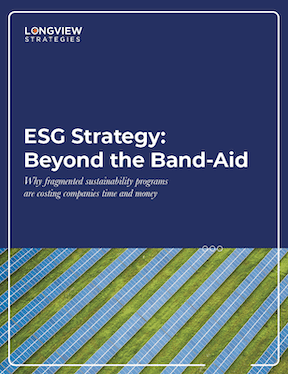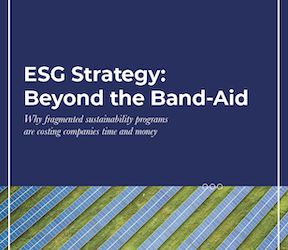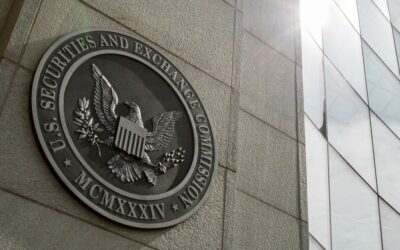![]() This post is about investing, market risk, and clarity of message. But with baseball season fully underway, we really should start with three guideposts for a good season:
This post is about investing, market risk, and clarity of message. But with baseball season fully underway, we really should start with three guideposts for a good season:
- Data doesn’t lie.
- You can never have enough starting pitching.
- Sign players for their future performance, not what they did five years ago.
The relevance, you ask? Wall Street will agree that its job is to find opportunities and manage risk. Success hinges on reading the data, looking ahead, and diversifying assets to avoid correlated collapses. (See? Just like baseball!)
So how does the Street adjust when unquantifiable risk enters the equation? Very slowly. Hence the barely perceptible investor response to climate change for the past 20 years.
The hold-up is a double roadblock based on the convergence of idealism and capitalism – each of which is naturally skeptical of the other. The first block is the assertion that investors have an obligation to support climate change mitigation and adaptation for the good of mankind. Unfortunately, good intentions don’t drive the market. The second block is the pervasive resistance to the idea that climate risk and other issues are impacting portfolios. That’s a myth based on markets of the past. It’s happening. Now. (Just ask PG&E).
The “good” news is that climate risk has become more easily recognizable, present, and measurable. Consider that BlackRock this month called for a critical change in perspective from theoretical to real and present dangers:
“Investors underestimate the risks that extreme weather poses to their portfolios, according to landmark research by BlackRock that could drastically alter how the investment industry considers climate change in its risk management processes… ‘The research demonstrates that if you are…not asking questions about how climate-related risks are affecting your investments, you are missing risks that are in the market today.’” (Financial Times, BlackRock analysis helps define climate-change risk, subscription required)
A recent New York Times Magazine article captured the conundrum in an intelligent and sweeping examination of where giants currently sit on both sides of the investing equation (the article, by the way, should be required reading for anyone who wants to understand the current state). While Exxon Mobil essentially deploys renewable energy to more efficiently power its fossil fuel extraction, the smartest investors in the world are accepting that climate risk and capitalism should actually go hand in hand. Jesse Barron writes:
[Jeremy Grantham’s] confidence derives from an odd and specific conviction that “sooner or later, there will be a carbon tax,” and much of the market capitalization of the leading oil and gas companies will be erased. “You have a certainty,” he said. “It will happen. Or we’ll be on our way to a failed civilization.”
It took me a moment to process what this meant. Grantham was saying that a bet on a future carbon tax was a sure thing because the absence of a carbon tax meant civilizational catastrophe. If he were right, he could make billions. If he were wrong, it wouldn’t matter, because the world would be on fire. “Perfectly fine logic,” Grantham said.
Why the majority of the investing world doesn’t embrace Gratham’s conviction is no mystery. There is so much emphasis on capturing the upside of the market momentum in this exact moment that most investors simply aren’t willing to integrate a broader set of risks. Indeed, the same New York Times piece notes that “practically no one in the financial system is directly incentivized in the near term to worry about the biggest risk conceivable.”
The dueling viewpoints cross into our work on the communications side. For investments in climate change adaptation to become baked into market strategy, the prevailing message needs to change. Forget about the fact that we want to survive as a species. Think instead about which investments will thrive when storms drown entire islands, or will create more efficient energy delivery, or will be critical when water supplies tank (pun intended) or food shortages cripple major metropolitan areas.
Our belief is that change is coming to the way the world invests, but it will continue to be a rocky shift until the message is clear.




